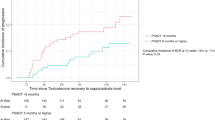Summary
It is current practice in many clinical trials evaluating new chemotherapy regimens for the treatment of advanced prostate cancer to use prostate-specific antigen (PSA) decline as a response criteria with the assumption that the level of PSA reflects the efficacy of chemotherapy. Advanced prostate cancer is heterogeneous; therefore, the validity of PSA decline as a measurable end point was studied in advanced human prostate-cancer cell lines: androgen-sensitive LNCaP and androgen-insensitive PC3 cells. Each cell line was grown for 4 days with escalating doses of Adriamycin or vinblastine. Cell counts, intracellular PSA concentrations, and secreted PSA levels were determined daily for 4 days. Untreated LNCaP cells had constant secretion of PSA per cell. In contrast, LNCaP cells treated with Adriamycin or vinblastine had an 80% reduction in cell numbers and a 3-fold increase in secreted PSA per cell by day 4. In contrast, PC3 cells had a different response to Adriamycin and vinblastine. Both drugs reduced cell numbers by 97% of control values and suppressed PSA production in the remaining viable cells by 4 days in culture. Thus, prostate-cancer cell production of PSA is variable with chemotherapy and the PSA level may not accurately reflect the actual tumor response to chemotherapy.
Similar content being viewed by others
References
Eisenberger MA, Reyno LM, Jodrell DI, Sinibaldi VJ, Tkaczuk KH, Sridhara R, Zuhowski EG, Lowitt MH, Jacobs SC, Egorin MJ (1993) Suramin, an active drug for prostate cancer: interim observations in a phase I trial. J Natl Cancer Inst 85:611–618
Gospodarowicz D, Ferrara N, Schweigerer L, Neufeld G, (1987) Structural characterization and biological functions of fibroblast growth factor. Endocrine Rev 8:95–114
Hasenson M, Lundh R, Stege R, Carlstrom K, Pousette A (1989) PAP and PSA in prostatic carcinoma cell lines and aspiration biopsies: relation to hormone sensitivity and to cytological grading. Prostate 14:83–90
Hudes GR, Greenberg R, Krigel RL, Fox S, Scher R, Litwin S, Watts P, Speicher L, Tew K, Comis R (1992) Phase II study of estramustine and vinblastine, two microtubule inhibitors, in hormone-refractory prostate cancer. J Clin Oncol 10:1754–1761
Hussain MH, Pienta KJ, Redman BG, Cummings GD, Flaherty LE (1994) Oral etoposide in the treatment of hormone-refractory prostate cancer. Cancer 74:100–103
Kelly WK, Scher HI, Mazumdar M, Vlamis V, Schwartz M, Fossa SD (1993) Prostate-specific antigen as a measure of disease outcome in metastatic hormone-refractory prostate cancer. J Clin Oncol 11:607–615
La Rocca RV, Danesi R, Cooper MR, Jamis-Dow CA, Ewing MW, Linehan WM, Myers CE (1991) Effect of suramin on human prostate cancer cells in vitro. J Urol 145:393
Laurie JA, Hahn RG, Therneau TM, Patel SR, Mailliard JA, Windschitl HE, Twito DI, Morton RF, Kroof JE (1992) Chemotherapy for hormonally refractory advanced prostate carcinoma. Cancer 69:1440–1444
Newling DWW (1992) The use of Adriamycin and its derivatives in the treatment of prostatic cancer. Cancer Chemother Pharmacol 30 [Suppl]:S90-S94
Osborne CK, Blumenstein B, Crawford ED, Coltman CA, Smith AY, Lambuth BW, Chapman RA (1990) Combined versus sequential chemo-endocrine therapy in advanced prostate cancer: final results of a randomized Southwest Oncology Group study. J Clin Oncol 8:1675–1682
Partin AW, Oesterling JE (1994) The clinical usefulness of prostate specific antigen: update 1994. J Urol 152:1358–1368
Rangel C, Matzkin H, Soloway MS (1992) Experience with weekly doxorubicin (Adriamycin) in hormone-refractory stage D2 prostate cancer. Urol 39:577–582
Seidman AD, Scher HI, Petrylak D, Dershaw DD, Curley T (1992) Estramustine and vinblastine: use of prostate specific antigen as a clinical trial endpoint for hormone refractory prostatic cancer. J Urol 147:931–934
Sella A, Kilbourn R, Amato R, Bui C, Zukiwski AA, Ellerhorst J, Logothetis CJ (1994) Phase II study of ketoconazole combined with weekly doxorubicin in patients with androgen-independent prostate cancer. J Clin Oncol 12:683–688
Sher HI, Curley T, Geller N, Engstrom C, Dershaw DD, Lin S, Fitzpatrick K, Nisselbaum J, Schwartz M, Bezirdjian L, et al (1990) Trimetrexate in prostate cancer: preliminary observations on the use of prostate-specific antigen and acid phosphatase as a marker in measurable hormone-refractory disease. J Clin Oncol 8:1830–1838
Van Rijswijk REN, Cvitkovic E, Wagstaff J, Myers CE (1993) Workshop on suramin with emphasis on prostate cancer: reevaluation of response criteria. Eur J Cancer [A] 29:298–300
Yagoda A, Petrylak D (1993) Cytotoxic chemotherapy for advanced hormone-resistant prostate cancer. Cancer 71:1098–1109
Author information
Authors and Affiliations
Rights and permissions
About this article
Cite this article
Seckin, B., Anthony, C.T., Murphy, B. et al. Can prostate-specific antigen be used as a valid end point to determine the efficacy of chemotherapy for advanced prostate cancer?. World J Urol 14, S26–S29 (1996). https://doi.org/10.1007/BF00182061
Issue Date:
DOI: https://doi.org/10.1007/BF00182061




